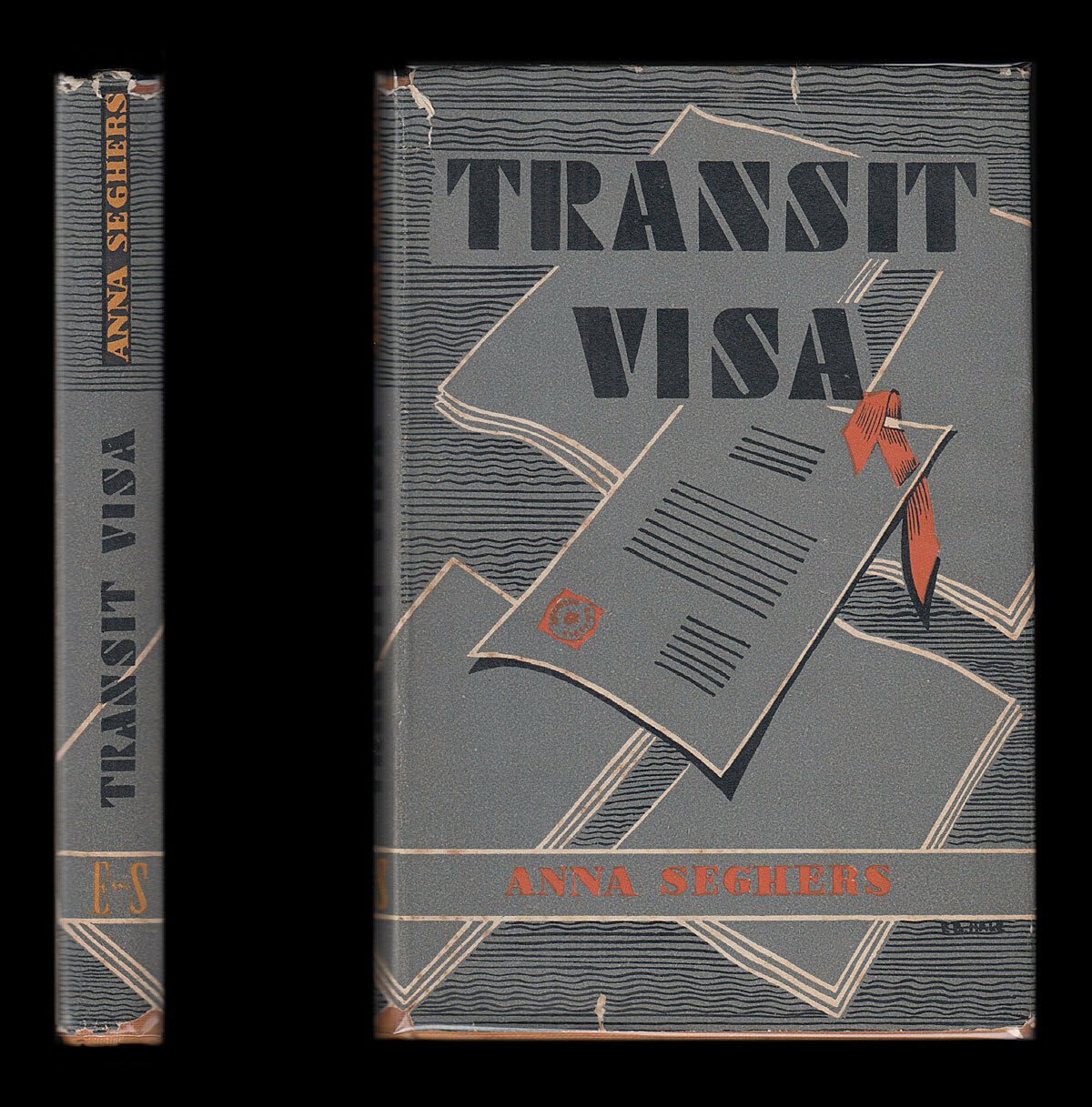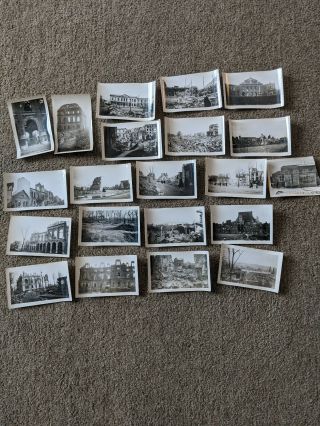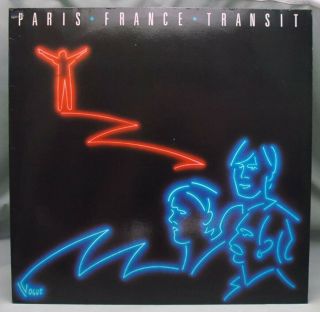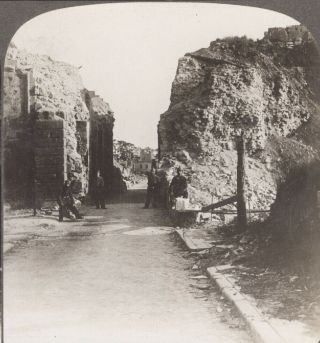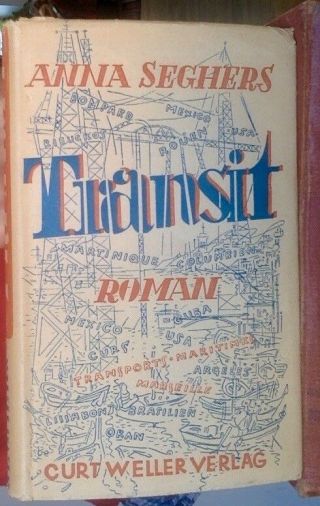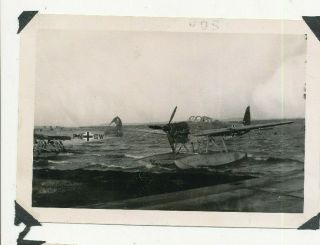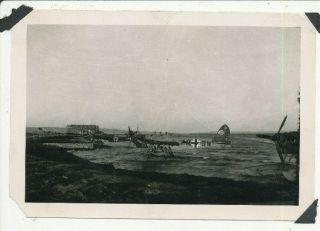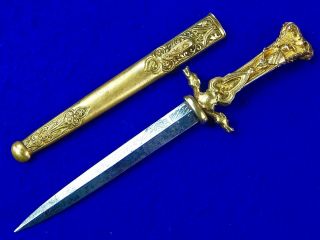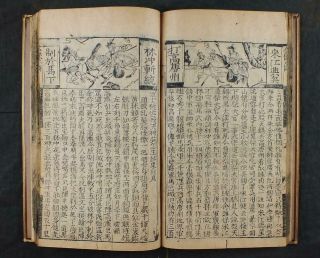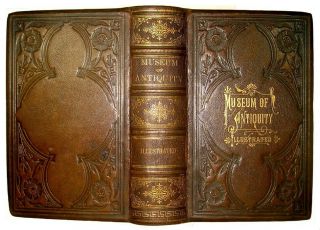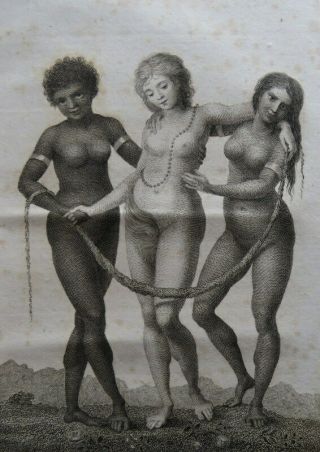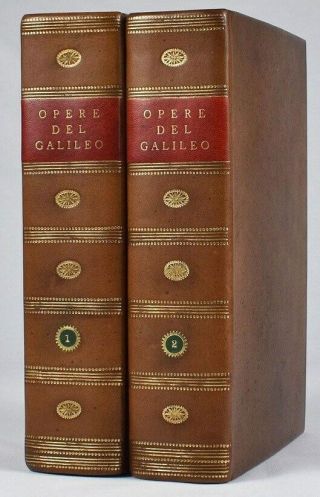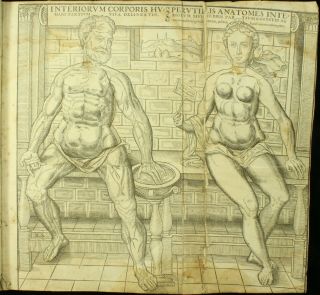ANNA SEGHERS Marseilles TRANSIT VISA France After German Invasion - 1945 Edition
Item History & Price
Transit Visa
by Anna Seghers Translated from the German by James A. Galston
This is the 1945 First English Edition
Front cover and spine Further images of this book are shown below
Publisher and place of publication ... Dimensions in inches (to the nearest quarter-inch) London: Eyre and Spottiswoode 4¾ inches wide x 7¾ inches tall Edition Length 1945 First English Edition ["This Book First Published in 1945 is Printed in Great Britain For Eyre And Spottiswoode (Publishers) Ltd. 15 Bedford Street, Strand, London, W.C.2 at the Chapel River Press, Andover, Hants."] 260 pages Condition of covers Internal condition Original tan cloth blocked in black. The covers are rubbed but still quite fresh, having been protected by the dust-jacket. The spine ends and corners are bumped. There are no internal markings and the text is clean throughout on tanned paper. The edge of the text block is dust-stained and foxed. In common with most books produced in England in 1945, the paper quality is not of the highest standard. Dust-jacket present? Other comments Yes: however, the dust-jacket is scuffed, creased around the edges and torn with some loss. There is a one inch tear from the front spine gutter at the head and a slightly shorter tear on the centre top-edge of the front panel. There is another small tear on the centre bottom-edge of the front panel. The ends of the spine panel are chipped with some loss. The inside of the dust-jacket is foxed and the rear panel foxed and grubby. The final images below give a good indication of the current state of the dust-jacket. A particularly rare title, especially with the original dust-jacket, though this is damaged, as described. Illustrations, maps, etc Contents NONE : No illustrations are called for There are ten untitled chapters Post & shipping information Payment options The packed weight is approximately 500 grams.
Full shipping/postage information is provided in a panel at the end of this listing. Payment options : UK buyers: cheque (in GBP), debit card, credit card (Visa, MasterCard but not Amex), PayPal
International buyers: credit card (Visa, MasterCard but not Amex), PayPal Full payment information is provided in a panel at the end of this listing.
Transit Visa Chapter I i
The Montreal, they say, has gone down between Dakar and Martinique. Struck a mine. The steamship company refuses to give out any information. Perhaps it's all just a rumour. Compared with the fate of other ships that were chased from ocean to ocean with their loads of refugees, turned away at every port, permitted to be deliberately set afire on the high seas rather than to cast anchor, just because their passengers' papers had become invalid a few days before—compared with the fate of such ships, I say, the sinking of the Montreal in time of war is only a natural death for a ship. If, I repeat, it's not all just a rumour; if in the meantime she hasn't been captured or ordered back to Dakar. In that case the passengers will be steaming in some camp on the edge of the Sahara. But perhaps by now they're luckily across the ocean. You think this is all unimportant? You're bored? So am I. Have a drink with me, won't you? Unfortunately I haven't the money for a regular supper. Just a glass of rose and a piece of pizza. Let's sit here. Which view do you prefer? The pizza baking over the open fire? Then you'll have to sit beside me. The Old Harbour? Then you'd better sit opposite. You can see the sun go down behind Fort Saint-Nicolas. That won't bore you, I'm sure.
A strange kind of pastry, this pizza. Round and fancy-coloured like a cake. You're prepared for something sweet, and instead you get a mouthful of pepper. Looking at it closer, you realize that those things aren't cherries and raisins, but paprika and olives. You get accustomed to it. Too bad they're demanding bread cards even for pizza.
I'd like to know if the Montreal really did go down. What would all those people do over there, supposing they actually got there? Begin a new life? Take up some trade or occupation? Hurry from one relief committee to another? Clear the forests? If there really was a perfect wilderness over there, one that rejuvenates everybody and everything, I might almost regret that I didn't go along. I had every chance to, let me tell you. A ticket all paid for, a visa, a transit permit. But I suddenly decided not to go.
There was one couple on the Montreal whom I knew casually. You know what they amount to, these casual acquaintances made in railway stations, in the waiting-rooms of consulates, or at the visa department of the prefecture. The rustling of a few words is so casual, like banknotes changing hands in a hurry! But sometimes we are struck by a single word—a face. It's as if it went right through us, quickly but gently. We look up, prick up our ears, and before we realize it we're implicated in something.
I'd really like to tell somebody everything from beginning to end. If only I weren't afraid of boring him! Tell me, aren't you thoroughly fed up with all these exciting tales? Tired to death of thrilling stories of breathless flights, of hairbreadth escapes from death? Myself, I'm sick and tired of it all. If there's anything that can still excite me it's probably the number of feet of iron wire an old workman has produced in his life, and what tools he used, or the light by which schoolchildren are doing their homework.
Watch yourself with that rose. It goes down just like the raspberry juice it looks like. You get unbelievably cheerful. Nothing seems unbearable. But when you want to get up, your knees shake. Melancholy, eternal melancholy, seizes you—until the next rose. All you want is just to sit there in your chair, never to be implicated in anything.
I used to get implicated in things which to-day I'm ashamed of. Just a little ashamed, you understand, for hat's all past and gone. But it would bother me no end if I bored anyone. . . . All the same, I want to tell you my story.
ii
Toward the end of last winter I got into a labour camp near Rouen. My uniform—that of a French prestataire—was the shabbiest one of any army in the war. Because we were foreigners we were put behind barbed wire at night, half prisoners and half soldiers, but during the day we did "labour service." We had to unload English munition ships. We were bombed fiercely. The German planes swooped so low that their shadows darkened us. That made me understand the expression, "under the shadow of death."
One day I was unloading with a young chap, little Franz, they called him. He was as near me as you are now. The sun was shining. Suddenly there was a roaring in the air. Little Franz looked up. The planes flew low; their shadows made his face look black. Tshooook! A bomb struck near us. You know about that as well as I do. After all, everything comes to an end. The Germans were coming. What did the terrors and sufferings we had had to endure matter now? The end of the world was at hand—to-morrow, to-night, right now. For we all believed that the arrival of the Germans meant something of the kind. Bedlam broke out in our camp. Some of the men sobbed, some prayed, several tried to commit suicide, some of them succeeded. Others tried to escape—as if one could escape the day of judgment! The commander had planted machine guns at the camp gate. We told him that since we had fled from our native Germany, the Germans would shoot us down on sight. But all he knew about was handing on orders he received. Now he was waiting for instructions regarding what was to be done with the camp. His chief had taken to his heels long ago, the little town had been evacuated, the peasants had fled from the neighbouring villages. Would the Germans be here in two days or two hours? Well, to do him justice, the commander wasn't too bad a fellow. For him the war was still on—-a genuine war. He couldn't understand the depths of infamy, the degree of betrayal. We finally managed to reach a kind of understanding with him. One machine gun would remain at the gate because the order had not been countermanded, but he would not take too good an aim at us if we scaled the wall.
So a few dozen of us went over the wall at night. One of us, Heinz was his name, had lost his right leg in the war in Spain. He spent a lot of time in southern camps after that war. Goodness only knows why he was ever sent to our camp—he really wasn't fit for a labour camp. Anyway, we had to get him over the wall. As we were in one hell of a hurry we took turns carrying him through all that night, with the Germans practically at our heels.
Every one of us had a very good reason why he didn't want to fall into German hands. I myself had escaped from a German concentration camp in 1937 and had swum the Rhine at night. For all of six months I was very proud of chat. But other and newer things happened to the world and to me. Now, I was fleeing for the second time—this time from a French camp—and I thought of my first flight from the German camp.
Little Franz and I hurried along side by side. Like most people in those days we set ourselves a goal as children do ; our goal was to get across the Loire. We went across country to avoid the main highways. We went through deserted villages where unmilked cows were mooing. We looked for something to set our teeth in, but everything had been eaten up; gooseberry bushes as well as barns were empty. We wanted a drink of water, but the water pipes had been cut. The sound of shooting had stopped. In one village, only an idiot remained behind, and he couldn't give us any information. It was then that we were overcome with dread. That desolation was more oppressive than the bombings on the docks. At last we struck the Paris road. We weren't the last ones, not by a long shot. A silent stream of refugees was still pouring from the villages to the north. There were carts tall as a farmhouse with their load of furniture and chicken coops, children and old people, goats and calves; trucks filled with sisters from a nunnery; a little girl pushing her mother along on a wheelbarrow; motor cars in which sat handsome, tense women wearing the furs they had managed to save. But their cars were drawn by cattle, for all the petrol stations had closed. Women were dragging dying children along, some of them already dead.
It was then that I first wondered what it was, after all, that made these people flee. Were they fleeing from the Germans? What good was it, since the Germans were motorised? From death? There could be no doubt that death could overtake them at will on the road. But, as I say, this thought didn't occur to me until then, until I saw the most wretched of the refugees.
Little Franz got a lift, and a truck picked me up. Near a village, another truck bumped into the one I was on, and I had to go on on foot. I never saw little Franz again.
I hit across country once more and came to a large out-of-the-way farmhouse where there were still people. I asked for something to eat and drink and was surprised when the woman set a plate of soup and some wine and bread on a table in the garden for me. She told me that there had been a long family discussion, and that they had decided to flee. Everything was packed and ready to be loaded on the truck.
While I was at the table there in the garden, planes droned rather low overhead, but I was too tired to look up. Not far away, there was a short burst of machine-gun fire. I couldn't tell where it came from, but was too exhausted to give it a thought. All I thought of was the possibility of getting a lift on the truck. The motor was already running. The woman was scuttling excitedly back and forth between the truck and the house. It was clear that she was sorry to leave her fine home. Like all of us in similar circumstances, she was gathering up all sorts of useless things. Then she came over to me, took away my plate, and said, "That's all!"
I looked up. She was gaping open-mouthed across the hedge. I turned around . . .
Transit Visa From the dust-jacket: Set in Marseilles after the fall of France, among the exiles of all nationalities, Germans, Austrians, Czechs, Jews and Spaniards, trying to get exit permits for the Americas, this refugee story makes its point by its ironical handling and sense of the ludicrous. The misadventures and emotional tangles of these uprooted people, suspended in an unfriendly void, pile up into a tragi-comic nightmare, told with a detachment that is rare among books of this kind.
Synopsis and Biographical Information: Anna Seghers (19 November 1900 – 1 June 1983) was a German writer famous for depicting the moral experience of the Second World War. The pseudonym Anna Seghers was apparently based on the surname of the Dutch painter and printmaker Hercules Pieterszoon Seghers or Segers (c. 1589 – c. 1638). Born Anna (Netty) Reiling in Mainz in 1900 into a Jewish family, her father was a dealer in antiques and cultural artefacts. She married László Radványi, also known as Johann Lorenz Schmidt, a Hungarian Communist in 1925, thereby acquiring Hungarian citizenship.
In Cologne and Heidelberg she studied history, the history of art and Chinese. She joined the Communist Party of Germany in 1928, at the height of its struggle against the burgeoning National Socialist German Workers Party. Her 1932 novel, Die Gefährten was a prophetic warning of the dangers of Fascism, which led to her being arrested by the Gestapo. In 1932, she also formally left the Jewish community.
By 1934 she had emigrated, via Zurich, to Paris. After German troops invaded the French Third Republic in 1940, she fled to Marseilles and one year later to Mexico, where she founded the anti-fascist 'Heinrich-Heine-Klub', named after the German Jewish poet Heinrich Heine, and founded Freies Deutschland (Free Germany), an academic journal.
In 1947, Anna Seghers returned to Germany, moved to West Berlin, and became a member of the SED in the zone occupied by the Soviets and received Georg Büchner Prize in the same year. In 1950, she moved to East Berlin and became a member of World Peace Council. In 1951, she received the first Nationalpreis der DDR, the Stalin Peace Prize also in 1951, and an honorary doctorate by the University of Jena in 1959. In 1981, she became honorary citizen of her native town Mainz. She died in Berlin on 1 June 1983. Synopsis
The novel takes place in France after the German invasion. The twenty-seven year old unnamed narrator has escaped from a Nazi concentration camp. Along the way to Marseilles, he meets one of his friends, Paul. Paul then asks the narrator to deliver a letter to a writer named Weidel in Paris. When the narrator goes to deliver the letter, he finds out that Weidel has committed suicide. The narrator also finds that Weidel left behind a suitcase full of letters and an unfinished manuscript for a novel.
Arriving in Marseilles, the narrator describes the chaos of a town full of people desperate to escape the Nazis. Most of his time is spent in cafes seeing the same people, with ever limited amounts of food and alcohol on sale. A mystery woman who hunts the cafes is Weidel's estranged wife, desperate for his help to leave France. She doesn't know Weidel is dead. The narrator is in love with her and tries to arrange matters so she can leave with him, without her knowing that he has assumed Weidel's identity (and Mexican visa). Throughout the story, the narrator converses with several other refugees, sharing stories and experiences along the way. The story draws on Seghers' own experience in wartime France.
Please note: to avoid opening the book out, with the risk of damaging the spine, some of the pages were slightly raised on the inner edge when being scanned, which has resulted in some blurring to the text and a shadow on the inside edge of the final images. Colour reproduction is shown as accurately as possible but please be aware that some colours are difficult to scan and may result in a slight variation from the colour shown below to the actual colour. In line with eBay guidelines on picture sizes, some of the illustrations may be shown enlarged for greater detail and clarity. The dust-jacket is scuffed, creased around the edges and torn with some loss. There is a one inch tear from the front spine gutter at the head and a slightly shorter tear on the centre top-edge of the front panel. There is another small tear on the centre bottom-edge of the front panel. The ends of the spine panel are chipped with some loss. The inside of the dust-jacket is foxed and the rear panel foxed and grubby.
U.K. buyers: To estimate the “packed weight” each book is first weighed and then an additional amount of 150 grams is added to allow for the packaging material (all books are securely wrapped and posted in a cardboard book-mailer). The weight of the book and packaging is then rounded up to the nearest hundred grams to arrive at the postage figure. I make no charge for packaging materials and do not seek to profit from postage and packaging. Postage can be combined for multiple purchases. Packed weight of this item : approximately 500 grams Postage and payment options to U.K. addresses: Details of the various postage options can be obtained by selecting the “Postage and payments” option at the head of this listing (above). Payment can be made by: debit card, credit card (Visa or MasterCard, but not Amex), cheque (payable to "G Miller", please), or PayPal. Please contact me with name, address and payment details within seven days of the end of the auction; otherwise I reserve the right to cancel the auction and re-list the item. Finally, this should be an enjoyable experience for both the buyer and seller and I hope you will find me very easy to deal with. If you have a question or query about any aspect (postage, payment, delivery options and so on), please do not hesitate to contact me.
International buyers: To estimate the “packed weight” each book is first weighed and then an additional amount of 150 grams is added to allow for the packaging material (all books are securely wrapped and posted in a cardboard book-mailer). The weight of the book and packaging is then rounded up to the nearest hundred grams to arrive at the shipping figure. I make no charge for packaging materials and do not seek to profit from shipping and handling. Shipping can usually be combined for multiple purchases (to a maximum of 5 kilograms in any one parcel with the exception of Canada, where the limit is 2 kilograms). Packed weight of this item : approximately 500 grams International Shipping options: Details of the postage options to various countries (via Air Mail) can be obtained by selecting the “Postage and payments” option at the head of this listing (above) and then selecting your country of residence from the drop-down list. For destinations not shown or other requirements, please contact me before buying. Due to the extreme length of time now taken for deliveries, surface mail is no longer a viable option and I am unable to offer it even in the case of heavy items. I am afraid that I cannot make any exceptions to this rule. Payment options for international buyers: Payment can be made by: credit card (Visa or MasterCard, but not Amex) or PayPal. I can also accept a cheque in GBP [British Pounds Sterling] but only if drawn on a major British bank. Regretfully, due to extremely high conversion charges, I CANNOT accept foreign currency : all payments must be made in GBP [British Pounds Sterling]. This can be accomplished easily using a credit card, which I am able to accept as I have a separate, well-established business, or PayPal. Please contact me with your name and address and payment details within seven days of the end of the auction; otherwise I reserve the right to cancel the auction and re-list the item. Finally, this should be an enjoyable experience for both the buyer and seller and I hope you will find me very easy to deal with. If you have a question or query about any aspect (shipping, payment, delivery options and so on), please do not hesitate to contact me. Prospective international buyers should ensure that they are able to provide credit card details or pay by PayPal within 7 days from the end of the auction (or inform me that they will be sending a cheque in GBP drawn on a major British bank). Thank you.
(please note that the book shown is for illustrative purposes only and forms no part of this auction) Book dimensions are given in inches, to the nearest quarter-inch, in the format width x height. Please note that, to differentiate them from soft-covers and paperbacks, modern hardbacks are still invariably described as being ‘cloth’ when they are, in fact, predominantly bound in paper-covered boards pressed to resemble cloth.
Fine Books for Fine Minds
I value your custom (and my feedback rating) but I am also a bibliophile : I want books to arrive in the same condition in which they were dispatched. For this reason, all books are securely wrapped in tissue and a protective covering and are then posted in a cardboard container. If any book is significantly not as described, I will offer a full refund. Unless the size of the book precludes this, hardback books with a dust-jacket are usually provided with a clear film protective cover, while hardback books without a dust-jacket are usually provided with a rigid clear cover. The Royal Mail, in my experience, offers an excellent service, but things can occasionally go wrong. However, I believe it is my responsibility to guarantee delivery. If any book is lost or damaged in transit, I will offer a full refund.
Thank you for looking.
Please also view my other listings for a range of interesting books
and feel free to contact me if you require any additional information Design and content © Geoffrey Miller



